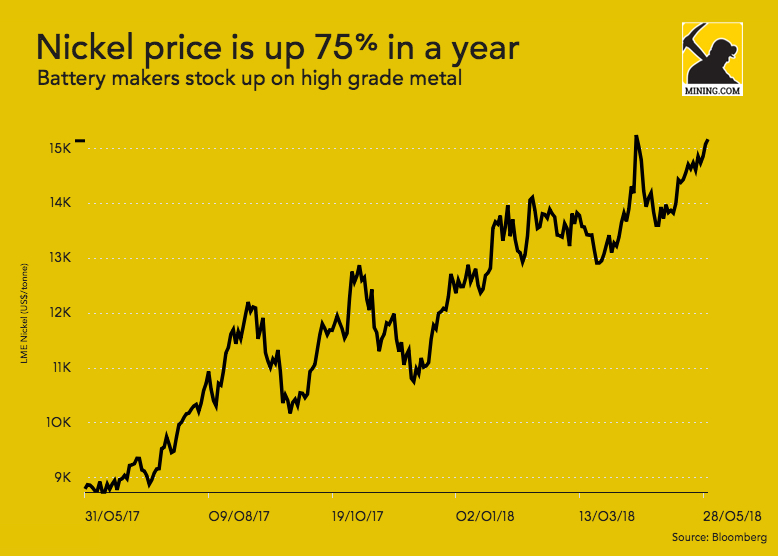Nickel Starting to Take Flight
posted on
Jun 04, 2018 10:35AM

NI 43-101 Update (September 2012): 11.1 Mt @ 1.68% Ni, 0.87% Cu, 0.89 gpt Pt and 3.09 gpt Pd and 0.18 gpt Au (Proven & Probable Reserves) / 8.9 Mt @ 1.10% Ni, 1.14% Cu, 1.16 gpt Pt and 3.49 gpt Pd and 0.30 gpt Au (Inferred Resource)

 <img width="902" height="500" src="http://www.mining.com/wp-content/uploads/2018/01/Black-And-White-Skydiving-Parachutist-Mountains-2856434.jpg" class="img-responsive wp-post-image" alt="Nickel price is soaring" srcset="http://www.mining.com/wp-content/uploads/2018/01/Black-And-White-Skydiving-Parachutist-Mountains-2856434.jpg 902w, http://www.mining.com/wp-content/uploads/2018/01/Black-And-White-Skydiving-Parachutist-Mountains-2856434-300x166.jpg 300w, http://www.mining.com/wp-content/uploads/2018/01/Black-And-White-Skydiving-Parachutist-Mountains-2856434-768x426.jpg 768w" sizes="(max-width: 902px) 100vw, 902px" />
<img width="902" height="500" src="http://www.mining.com/wp-content/uploads/2018/01/Black-And-White-Skydiving-Parachutist-Mountains-2856434.jpg" class="img-responsive wp-post-image" alt="Nickel price is soaring" srcset="http://www.mining.com/wp-content/uploads/2018/01/Black-And-White-Skydiving-Parachutist-Mountains-2856434.jpg 902w, http://www.mining.com/wp-content/uploads/2018/01/Black-And-White-Skydiving-Parachutist-Mountains-2856434-300x166.jpg 300w, http://www.mining.com/wp-content/uploads/2018/01/Black-And-White-Skydiving-Parachutist-Mountains-2856434-768x426.jpg 768w" sizes="(max-width: 902px) 100vw, 902px" />
The nickel price is on a tear supported by environmental production cuts across top producer China, plunging inventories and strong steel prices.
The most-traded nickel contract on the Shanghai Futures Exchange is set for a weekly gain of 5.6%, while open-interest – a measure of market participation – sits near record levels. On the London Metal Exchange, the price jumped to $15,340 a tonne on Friday, its highest close since January 2015.
The immediate driver for the surge in the price – up 75% over the past 12 months – is a sharp fall in stocks of the metal, mainly used to make stainless steel. Global stainless steel output grew 6% last year.
Exchange stocks of nickel are typically higher grade and suitable for battery productionNickel stocks in ShFE warehouses have dropped 39% over the past four months while inventories controlled by the LME have declined for 18 consecutive days. Total exchange stocks have dropped to below 300,000 tonnes, from more than 450,000 tonnes a year ago.
Total primary production of nickel is in the region of 2m tonnes annually and stagnated through the period of low prices. Ore supply is likely to increase sharply this year after Indonesia, top supplier to China's nickel pig iron producers, lifted its export ban.
Bullishness about booming demand from the electric vehicle battery market may also be a factor behind the rapid drawdown of stocks.
Nickel, manganese and cobalt are the crucial elements in batteries favoured by most of the world’s automakers. Exchange stocks of nickel are typically higher grade and suitable for battery production, whereas nickel used in steelmaking is not.
It's early days though. Today only 5% of nickel production goes into batteries and 1% in EV power plants.
